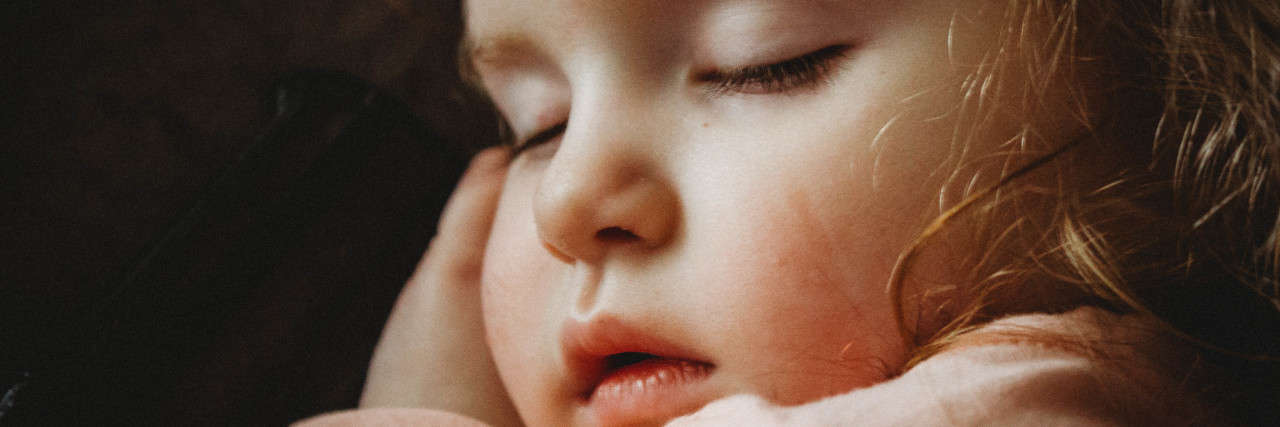How This One Little Word Helped Me Become the Mom I Wanted to Be
Does this word guide you as a parent, too?
When I gave birth to my first child, a girl, I was deep in the throes of what I had not yet realized was an abusive relationship. My marriage was chock full of manipulation and deceit. I was angry, resentful, frustrated, short-tempered and felt stuck. None of this was caused by or directed at my daughter; more so, myself and my husband. When I began to grasp what my present was and my future held, I knew I needed to make some changes.
My daughter was a few months old and until this point, I’d parented somewhat without a clear goal in mind. I definitely wanted to keep my baby alive, and I wanted her to grow up. But that’s all. I’d not yet inhaled that breath of hopeful air when a parent determines what kind of parent they actually want to be. I didn’t realize I even had a choice. I assumed I was me and that was it. I would parent as my parents did; after all, it’s all I knew.
I began thinking about what I liked about my childhood, and what I wish had been done differently. The resounding contradiction to my childhood and what I wanted was one thing: I wish I’d experienced life with more empathy.
According to Greater Good Magazine at Berkley, there are two types of empathy:
“Affective empathy” refers to the sensations and feelings we get in response to others’ emotions; this can include mirroring what that person is feeling, or just feeling stressed when we detect another’s fear or anxiety.“Cognitive empathy,” sometimes called “perspective taking,” refers to our ability to identify and understand other people’s emotions.
So, to be a good parent, all I need to do is two things.
- Pay attention to how my daughter feels
- Put myself in her shoes
Two things aren’t that many, so this would be very simple.
Except I had no idea how to do this. How do I learn to have empathy? I wondered if this was an innate ability afforded to others and not me, or if I could learn to develop it.
I began reading anything I could get my hands on. I came across Frans de Waal’s essay, The Evolution of Empathy.
“It is not something we only learn later in life, or that is culturally constructed. At heart, it is a hard-wired response that we fine-tune and elaborate upon in the course of our lives…”
I interpreted this to suggest that, with work and fine-tuning, there was hope for me. Now, while I’d had empathy for other adults, empathy for children was so very foreign to me. “Children are to be seen and not heard,” was a familiar phrase I’d heard growing up, mostly coming from distant relatives. I’d expected to want to teach my children the same: stay out of the way, be quiet, do what you’re told and I am the boss.
If you’ve ever parented children or perhaps, had a cat (cats react very similarly to children, in this aspect and many others), you know none of this is realistic without some form of indoctrination. I knew from experience that parenting through instilling fear would likely lead to maladjusted, incompetent adults, and that wasn’t my end game.
I made a list of how I could express empathy for my daughter. Being lovingly responsive was at the top. Listening to understand instead of respond, too. Flexibility, reflection, unconditional support, maintaining connection, reconnecting when necessary… the components of this one word, empathy, became quite demanding. I chose to change one thing at a time. I developed a parenting style that was relational with empathy at the center.
I won’t say I was or am a perfect parent. I’ve had my share of slip-ups, letdowns, and days that end with me realizing I did not do my best as a mother. But, more frequently, I realized how that list changed my life. Choosing empathy with my daughter taught me how to be gentle with myself and everyone else around me. When I left that marriage, I took with me a newfound sense of hope stemming from self-empathy. This optimism leads to self-compassion and self-kindness, allowing nonjudgmental flexibility and reflection. I experienced powerful healing through growth and became a much more well-adjusted adult because of that one little word: empathy.
Photo by Jessica Elkins.

